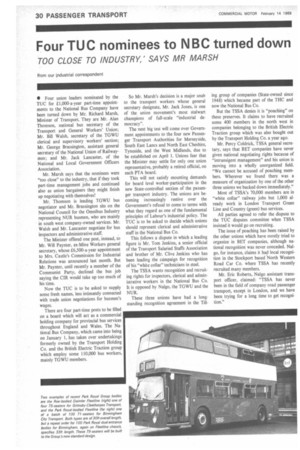Four TUC nominees to NBC turned down
Page 32

If you've noticed an error in this article please click here to report it so we can fix it.
TOO CLOSE TO INDUSTRY,' SAYS MR MARSH
from our Industrial correspondent • Four union leaders nominated by the TUC for L1,000-a-year part-time appointments to the National Bus Company have been turned down by Mr. Richard Marsh, Minister of Transport. They are Mr. Alan Thomson, national bus secretary of the Transport and General Workers' Union; Mr. Bill Walsh, secretary of the TGWU clerical and supervisory workers' section; Mr. George Brassington, assistant general secretary of the National Union of Railwaymen; and Mr. Jack Lancaster, of the National and Local Government Officers Association.
Mr. Marsh says that the nominees were "too close" to the industry, that if they took part-time management jobs and continued also as union bargainers they might finish up negotiating with themselves!
Mr. Thomson is leading TGWU bus negotiator and Mr. Brassington sits on the National Council for the Omnibus Industry representing NUR busmen, who are mainly in south west company-owned services. Mr. Walsh and Mr. Lancaster negotiate for bus inspectors and administrative staff.
The Minister offered one post, instead, to Mr. Will Paynter, ex-Mine Workers general secretary, whose f6,500-a-year appointment to Mrs. Castle's Commission for Industrial Relations was announced last month. But Mr. Paynter, until recently a member of the Communist Party, declined the bus job saying the CIR would take up too much of his time.
Now the TUC is to be asked to supply some fresh names, less intimately connected with trade union negotiations for busmen's wages.
There are four part-time posts to be filled on a board which will act as a commercial holding company for provincial bus services throughout England and Wales. The National Bus Company, which came into being on January 1. has taken over undertakings formerly owned by the Transport Holding Co. and the British Electric Traction group which employ some 110,000 bus workers, mainly TGWU members. So Mr. Marsh's decision is a major snub to the transport workers whose general secretary designate, Mr. Jack Jones, is one of the union movement's most stalwart champions of full-scale "industrial democracy".
The next big test will come over Government appointments to the four new Passenger Transport Authorities for Merseyside, South East Lanes and North East Cheshire, Tyneside, and the West Midlands, due to be established on April 1. Unions fear that the Minister may settle for only one union representative, probably a retired official, on each PTA board.
This will not satisfy mounting demands for board level worker-participation in the new State-controlled section of the passenger transport industry. The unions are becoming increasingly restive over the Government's refusal to come to terms with what they regard as one of the fundamental principles of Labour's industrial policy. The TUC is to be asked to decide which unions should represent clerical and administrative staff in the National Bus Co.
This follows a dispute in which a leading figure is Mr. Tom Jenkins, a senior official of the Transport Salaried Staffs Association and brother of Mr. Clive Jenkins who has been leading the campaign for recognition of his "white collar" technicians in steel.
The TSSA wants recognition and recruiting rights for inspectors, clerical and administrative workers in the National Bus Co. It is opposed by Nalgo, the TGWU and the NUR.
These three unions have had a longstanding recognition agreement in the Till
ing group of companies (State-owned since 1948) which became part of the THC and now the National Bus Co.
But the TSSA denies it is "poaching" on these preserves. It claims to have recruited some 400 members in the north west in companies belonging to the British Electric Traction group which was also bought out by the Transport Holding Co. a year ago.
Mr. Percy Coldrick, TSSA general secretary, says that BET companies have never given national negotiating rights because of "intransigent management" and his union is moving into a wholly unorganized field. "We cannot be accused of poaching members. Wherever we found there was a measure of organization by one of the other three unions we backed down immediately."
Most of TSSA's 70,000 members are in "white collar" railway jobs but 1,000 already work in London Transport Green Line and Country (green) bus services.
All parties agreed to refer the dispute to the TUC disputes committee when TSSA insisted it would go on recruiting.
The issue of poaching has been raised by the other unions which have mostly tried to organize in BET companies, although national recognition was never conceded. Nalgo, for instance, claims it had local recognition in the Stockport based North Western Road Car Co. where TSSA has recently recruited many members.
Mr. Eric Roberts, Nalgo assistant transport officer, claimed: "TSSA has never been in the field of company road passenger transport, except in London, and we have been trying for a long time to get recognition."


















































































































